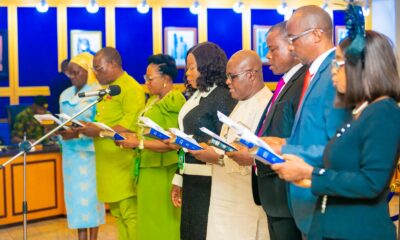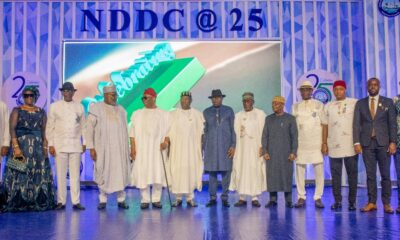Business
Jonathan Urged To Sign Amended Income Tax Law
The Association of Senior Civil Servants of Nigeria, (ASCSN) on Monday, in Abuja, called on President Goodluck Jonathan, to sign the amended personal income tax into law.
Mr Solomon Onaghinon, Secretary-General of the Association, told the newsmen that the call had become necessary due to rumours that the President had been under pressure by some state governors not to sign the bill.
Onaghinon said that this was based on the fact that if the President assented to the bill, it would reduce the quantum of taxation accruing to the state governors from workers’ salaries.
The association had in 2008 presented a memorandum to the Joint National Public Service Negotiating Council (JNPSNC) stressing the need for downward review of the Personal Income Tax to make it worker friendly.
The bill had gone through legislative process in the National Assembly including a public hearing before its approval by both the Senate and House of Representatives.
“But we are beginning to hear that one or two governors are feeling bad about the issue and they don’t want Mr President to sign it into law”.
“So we are saying that Mr President should sign that bill into law as early as possible”.
“They believed that the money they are going to get from personal income tax will reduce and that would really be workers gain”.
“That is the more reason why we are pressing on Mr President to sign it into law and all workers are going to benefit from it”.
“The relief that you are getting now is much higher than what is in the old law, if it is signed into law now, we will get higher relief.
“We find this highly objectionable because the state governors had all the opportunity in the world while the bill was being processed in the National Assembly to make their inputs.’’
Onaghinon said since the 2007, when the Consolidated Salary Structure became operational, the tax burden on civil servants had been very unbearable.
He said prior to the policy, only basic salaries of workers were taxed while allowances were tax-free for most grade levels.
Onaghinon added that since the Consolidated Salary Structure was introduced, middle and even junior government employees paid tax as high as 30 per cent of the consolidated salary.
“Our advice, therefore, is that Mr President should not succumb to such ill-motivated pressure intended to create disaffection between him and the public”.
“We enjoin you to be wary of those pushing you not to sign the new personal income tax act into law because they want to bring you into public ridicule”.
“We urge you to sign the bill into law now to bring relief to millions of civil servants and other Nigerian workers who are groaning and moaning under the weight of the prevailing tax regime.”
Mr Elaigwu John, ASCSN Unit’s Chairman, Federal Inland Revenue Services, told newsmen that the signing of the bill would reduce the tension of workers going on strike.
“We find out that so many institutions, like medical, universities, among others, are going on strike because the tax burden on them is too heavy because the tax law is outdated.
“When your chargeable income is reduced, it means that your tax pay roll is equally reduced; we are appealing to Mr President to sign the bill into law,” he added.
Business
NCDMB, Dangote Refinery Unveil JTC On Deepening Local Content

Business
Industry Leaders Defend Local Content, … Rally Behind NCDMB

Business
Replace Nipa Palms With Mangroove In Ogoni, Group Urges FG, HYPREP

-
News9 hours ago
South-South Contributes N34trn To Nigeria’s Economy In 2024 – Institute
-

 News4 hours ago
News4 hours agoIbas Inaugurates RSIEC, Service Commissions, Healthcare Board In Rivers …Charges Appointees To Embrace Principles Of Service
-

 Rivers8 hours ago
Rivers8 hours agoNDDC Inaugurates Ultra-Modern Market In Rivers Community
-
Rivers10 hours ago
Woji DPO: ‘A Police Officer With Impeccable Character’
-

 News6 hours ago
News6 hours agoNIMASA Shuts Two Lagos Terminals Over Security Breach
-
News9 hours ago
NOA Set To Unveil National Values Charter — D-G
-

 Politics4 hours ago
Politics4 hours agoAtiku Quits PDP, Says Decision Heartbreaking
-

 Features8 hours ago
Features8 hours ago25 Years After: NDDC Celebrates Milestones Of Impactful Development

